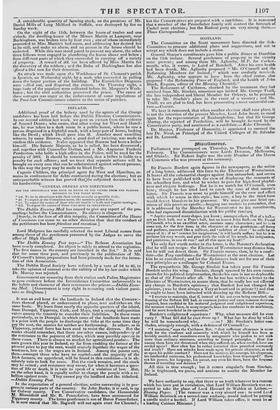Sir Francis Burdett again figures in the newspapers, as the
_writer of a long letter, addressed this time to the Electors of Westminster. It leaves all the substantial charges against him untouched, and seems to have been published with the view of displaying the remnants of his schoolboy lore, and what he wishes to pass for high-bred playful- ness and elegant badinage. But be is no match for O'Connell, even here' though he has tried hard to catch the tone of that nuister's letter. Sir Francis was wont to pride himself on the ease and effect with which be wrote in this style ; but now, a boy in the third form would detect blunders in his grammar. We must give one brief spe- cimen of this precicus epistle,--begging our readers to remember, that it is addressed by the Member for Westminster to his constituents, who had expressed dissatisfaction with his public conduct.
" Jupiter assumed many shapes, you know amongst others, that of a bull— not an Irish bull, nor a Pope's bull, but an honest John Bull—so Mr. Plaid O'Connell, who is an excellent actor, assumes many characters ; and he is to come out, for the first time, in the character of a tine gentleman—all finery and perfume, essenced like a milliner, and redolent of civet: ' he calls for aa ounce of it ; if to ' sweeten his imagination,' it will hardly suffice; but he is to perfume his very words, and pour forth tine vials of his wrath, his indignation, and patriotism, in eau de rose ! and all this upon my head!"
The only fact worth notice in the letter, is the Baronet's declaration that he will not resign : the Electors of Westminster may dismiss him, but he will not desert them. Sir Francis means, then, to be a candi- date—the Tory candidate—for 'Westminster at the next election. Let him be so considered ; and let the Reformers look out for one of their own principles as a colleague for Colonel Evans.
The sympathetic Mr. George Sinclair has taken poor Sir Franck Burdett under his wing. Sinclair, though spurned by his own consti- tuents for his political tergiversation, thinks his case is not so deplorable as that of Sir Francis after all. So he too has written a letter to the Electors of Westminster, to assure them, that he really has not effected any change in Burdett's opinions ; that Burdett has not changed his opinions, (was he then always a Tory at heart and in private?) and that he ought to have been intrusted with drawing up the Reform Bill-
" I venture to maintain, that if, instead of his not even being consulted, the framing of the Reform Bill had, as common justice and even common decorum required, been confided to his matured judgment and enlightened experience, the measure would have, in many respects, been less cumbrous in its machinery, and far more beneficial in its operation."
Burdett's enlightened experience! Why, what measure did he ever carry ? What bill did he ever draw lip ? What has he done by which
he will be remembered whe.. ,rie ? Mr. Sinclair's letter con- cludes, strangely enough, with a defence of O'Connell!—
" I maintain," says the Caithness Rat, "that sufficient allowance is never made for the virulence and animosity with which he himself has been m
lavishly assailed, and sometimes even by antagonists who profess to act with
more than ordinary strictness, according to Gospel principles. how few among them have not threatened when they suffered, or, when teviled, have not
reviled again? How often has he rather retracted than provoked contumely arid insult? Have not attacks been made upon his private character, as welt as upon his public conduct ? Have not his motives, his courage, his eloquerum, his intelleetaal eminence, his professional knowledge, been disparaged? Have not his person, his language, his accent, nay even his dress, been the frequent themes of scurrility and derision ?"
All this is true enough ; but it comes singularly from Sinclair. He is frightened, we guess, and anxious to soothe the Member for Ireland.


























 Previous page
Previous page